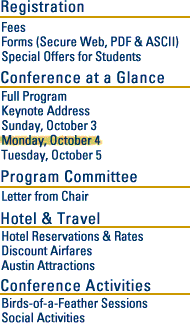 |
 |

|
Technical Sessions
Monday, October 4, 1999 8:45 am - 10:00 am Invited Talk
Peter Lee, Carnegie Mellon
University and Cedilla Systems Incorporated
Peter Lee is an Associate Professor of Computer Science at Carnegie Mellon University. His approach of applying theoretical ideas in programming language design to practical systems has led to numerous research contributions in the areas of programming language design, compiler technology, networking, and operating systems. Most recently, he has focused his attention on developing Proof-Carrying Code, a technique which uses program verification to enhance the performance and safety of mobile code. He is a principal investigator for the DARPA-sponsored Fox Project and is also the co-founder and president of Cedilla Systems Incorporated. 10:00 am - 10:30 am Break 10:30 am - 11:45 am DSLs and Monads Session Chair: Paul Hudak, Yale University
DSL Implementation Using Staging and Monads
Monadic Robotics
11:45 am - 1:30 pm Lunch (on your own) 1:30 pm - 3:00 pm Hot Research Review Session Chair: Todd Proebsting, Microsoft Research
Charles Consel, Irisa/University
of Rennes
In this talk I give an overview of a methodology for developing DSLs. I also demonstrate how program specialization can map DSL interpreters into efficient (possibly just-in-time) compilers. The presentation is illustrated by concrete examples. Charles Consel is a professor of computer science at the University of Rennes Irisa/Inria. He leads the Compose group at Inria. His group studies partial evaluation, a program transformation approach aimed at specializing programs with respect to given execution contexts. The work has been carried out with a program specializer for C called Tempo. This system has been successfully used in various applications such as operating systems and scientific code. A complementary research project is domain-specific languages: a software development approach that provides high productivity, easy maintenance, and improved safety (without giving up perfor-mance, thanks to partial evaluation). His work on programming languages, software engineering, and operating systems has led to many publications in major conferences and journals (POPL, PLDI, OOPSLA, ASE, SOSP, TOPLAS, ACM Surveys). 3:00 pm - 3:30 pm Break 3:30 pm - 4:30 pm Embedded Languages Session Chair: Michael Schwartzbach, University of Aarhus
Domain-Specific Embedded Compilers
Verischemelog: Verilog Embedded in Scheme
6:00 pm - 7:00 pm Conference Reception 8:00 pm - 11:00 pm Birds-of-a-Feather Sessions
|
|
Last changed: 2 Sep. 1999 mc |
|